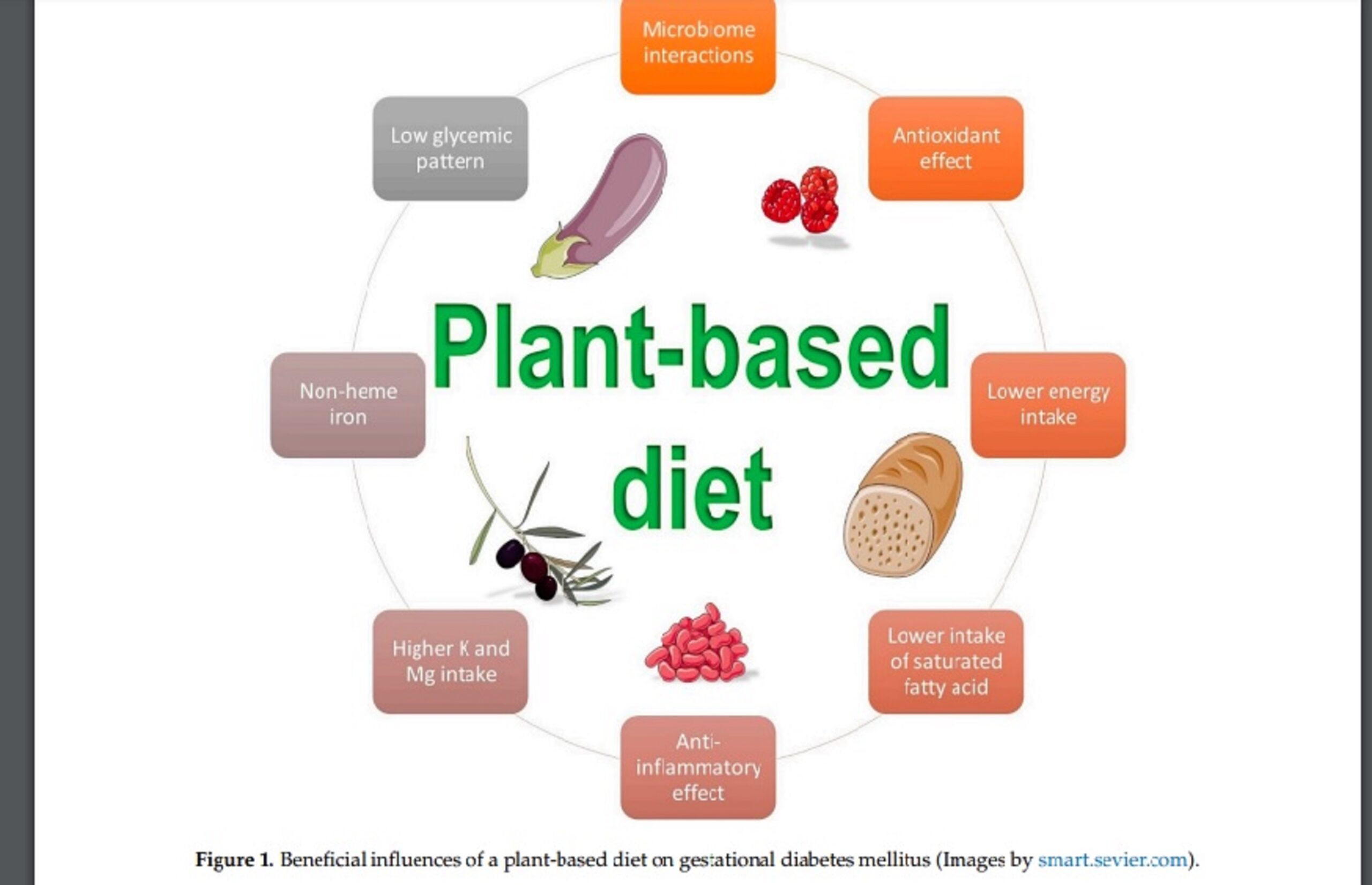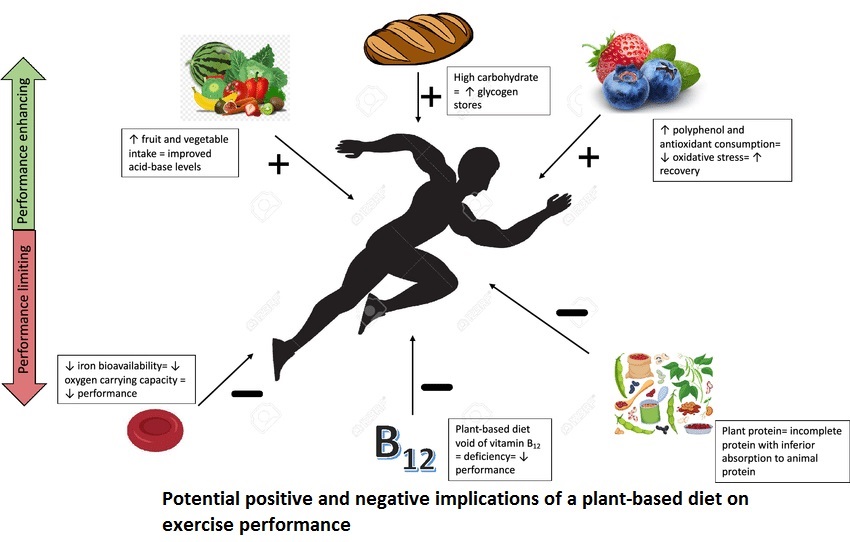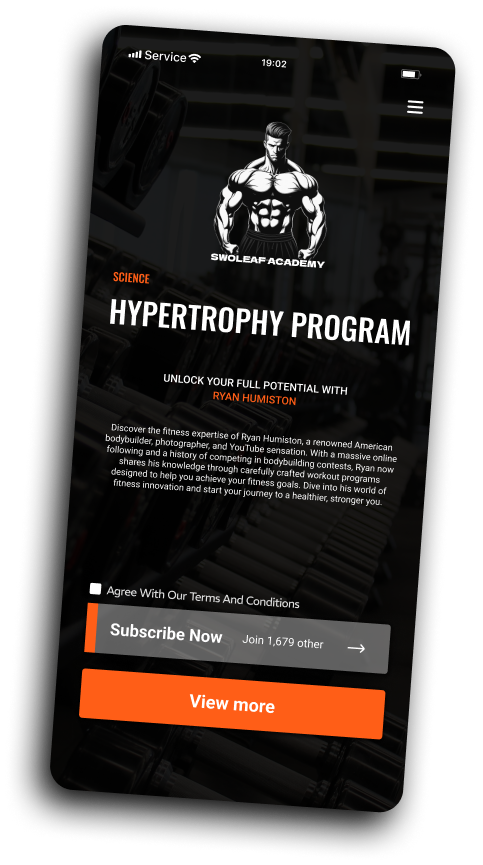A plant-based diet can taste bland and is boring is simply a myth. It can be rich in essential nutrients and can also be simply delicious. It is associated with the prevention of cancer, maintaining heart health, improving brain function, supporting the immune system, reducing inflammation, prolonging lifespan and decreasing the risk of diabetes. Research highlights the benefits of avoiding fish, eggs, pasta, and animal foods for weight loss, cholesterol management, heart disease, type 2 diabetes prevention, and environmental sustainability. Research suggests that including nutrient–rich foods such as avocado, broccoli, hummus, blueberries, strawberries and watermelon in our diet can enhance our immune system’s ability to combat infections effectively. The foundation for adopting a plant – based diet is rooted in the evidence that supports its positive effects on body weight management, disease prevention and overall health.

Plant-based diets have gained significant popularity in recent years due to their potential health benefits and positive impact on the environment. The global market for plant-based protein supplements was valued at $4.2 billion in 2018 and is projected to reach $7.0 billion by 2026. The plant-based diets prioritize the intake of foods derived from plants while reducing or excluding the consumption of animal-based products. Gaining understanding of the fundamental principles of plant-based diets empowers individuals to make informed decisions about their eating habits and improve their overall health and well-being.
The principles of a plant-based diet often involve:
- Emphasizing fruits and vegetables: Incorporating a wide variety of colorful fruits and vegetables ensures a diverse nutrient intake while providing essential vitamins and minerals.
- Including whole grains: Fiber, complex carbohydrates and essential nutrients are supplied by whole grains such as brown rice, quinoa and whole wheat bread.
- Prioritizing legumes: Legumes such as beans, lentils, and chickpeas are excellent sources of protein, fiber, and various micronutrients.
- Incorporating nuts and seeds: Nuts and seeds provide a source of nourishing fats, protein, fiber and micronutrients. They can be enjoyed as snacks or added to meals and recipes.
- Minimizing or eliminating animal products: While the extent of restriction may vary, plant – based diets generally involves reducing or eliminating the consumption of animal products such as meat, poultry, fish, dairy and eggs. Some individuals may choose to consume small amounts of animal products, while others adopt a fully vegan approach.
- Paying attention to nutrient balance: Adequate intake of essential nutrients like protein, omega-3 fatty acids, iron, calcium, vitamin D, and vitamin B12 should be considered. Plant-based sources of these nutrients can be included in the diet or supplemented when necessary.
- Choosing healthy fats: Opting for plant-based fats like avocados, olive oil, nuts, and seeds instead of saturated and Tran’s fats promote heart health.
Health Benefits of a Plant-Based Diet
Numerous scientific studies have extensively explored the beneficial health effects that come with adopting a plant-based diet. This eating pattern which prioritizes foods derived from plants while minimizing or eliminating animal products has demonstrated beneficial impacts on different aspects of human well–being.
Here are some supported benefits of a plant-based diet based on existing evidence and research findings:
- Cardiovascular Health: Plant-based diets have been linked to a reduced risk of cardiovascular diseases. Research suggests that these diets can lower blood pressure, improve blood lipid profiles, reduce the risk of heart disease, and promote overall cardiovascular well-being.
- Weight Management: Plant-based diets often promote weight management due to their lower calorie and saturated fat content coupled with higher fiber intake, which aids in maintaining a healthy weight. Studies have shown that individuals following plant-based diets often have lower body mass indexes (BMIs) and reduced risk of obesity.
- Diabetes Management: Plant-based diets, particularly those that are high in whole grains, legumes, and fiber-rich foods, have been associated with improved glycemic control and a reduced risk of type 2 diabetes.

- Cancer Prevention: Certain plant-based diets have been linked to a lower risk of certain types of cancer, including colorectal, breast, and prostate cancers. The high content of antioxidants, photochemical, and fiber in plant-based foods may contribute to their protective effects.
- Gut Health: Plant-based diets, especially those abundant in fiber, support a healthy gut micro biome. Adequate fiber intake from plant foods and pre biotics can promote regular bowel movements, prevent constipation, and contribute to a diverse and balanced gut micro biota.
- Inflammation Reduction: Various health conditions are linked to chronic inflammation. Plant-based diets, particularly those rich in anti-inflammatory foods like fruits, vegetables, nuts, and seeds help reduce systemic inflammation and associated health risks.
- Longevity: Multiple studies have observed a correlation between plant-based diets and enhanced lifespan. Diets rich in plant foods and low in animal products have been linked to a lower risk of premature death from cardiovascular disease, cancer, and other causes.
It’s important to note that the health benefits of a plant-based diet can vary depending on the specific foods consumed and the overall dietary pattern. Seeking personalized guidance from a registers dietician or healthcare professional is recommended as individual needs and considerations should be taken into account.
Plant-based Proteins For Muscle Building
Achieving and maintaining muscle mass on a plant-based diet is possible by monitoring and selecting foods that are high in protein. Although animal products are commonly recognized as complete protein sources, plant based alternatives can supply the essential amino acids requires for muscle repair and growth. Here are some plant-based protein sources that can be incorporated into a muscle-building diet:
- Legumes: Legumes such as lentils, chickpeas and black beans are excellent sources of protein. They also offer fiber, complex carbohydrates and various minerals. Adding legumes to meals like salads, soups and stews can contribute to meeting protein needs.
- Soy Products: Tofu, tempeh and soy milk which are made from soybeans are considered complete protein sources. They provide all essential amino acids necessary for muscle growth. These versatile soy products can be grilled, sautéed, or added to various dishes as meat substitutes.
- Quinoa: Quinoa is a highly nutritious pseudo-grain that provides all essential amino acids making it a complete protein.
- Seitan: Seitan, also known as wheat gluten, is a high-protein meat substitute made from gluten. It has a chewy texture and can be seasoned and prepared in a variety of ways, including grilling, sautéing, or baking.
- Hemp Seeds: Hemp seeds are abundant in protein, beneficial fats and dietary fiber. They can be sprinkled on top of salads, blended into smoothies, or incorporated into baking recipes to enhance protein content.
- Chia Seeds: Chia seeds are a versatile ingredient that offers protein, omega-3 fatty acids and fiber. They can be incorporated into various dishes such as yogurt, oatmeal or used as a substitute for eggs in baking.
- Nuts and Nut Butters: Nuts like almonds, walnuts, and cashews, as well as their respective butters, offer protein, healthy fats, and other essential nutrients. They make for convenient and nutritious snacks or can be incorporated into recipes and smoothies.
- Plant-Based Protein Powders: Plant-based protein powders, such as those derived from peas, brown rice, or hemp, are convenient options to supplement protein intake. They can be mixed into smoothies or used in baking recipes to increase protein content.
For optimal muscle growth on a plant-based diet, it is crucial to evenly distribute protein consumption throughout the day and incorporate a variety of plant-based protein sources. Aim for a balanced diet that includes a variety of fruits, vegetables, whole grains, and healthy fats alongside protein-rich plant foods.
Plant-based Diet For Endurance Athletes
Endurance athletes, such as runners, cyclists, and triathletes, can effectively fuel their performance and sustain energy levels on a plant-based diet. By incorporating nutrient-dense plant foods and strategic meal planning, athletes can meet their energy requirements and optimize their performance. Here are some key considerations for a plant-based diet tailored to endurance athletes:
- Carbohydrate-rich Foods: Foods rich in carbohydrates serve as the main source of energy for endurance activities. Incorporate complex carbohydrates from whole grains (e.g., brown rice, quinoa, oats), starchy vegetables (e.g., sweet potatoes, corn), and legumes (e.g., lentils, chickpeas) to provide sustained energy throughout workouts and races.
- Fruit and Vegetable Variety: Fruits and vegetables are abundant in antioxidants, vitamins, minerals, and fiber. Aim for a diverse range of colorful options to support immune function, aid in recovery, and provide essential nutrients for optimal performance.
- Adequate Protein Intake: While carbohydrates are crucial for energy, protein is necessary for muscle repair and recovery. Include plant-based protein sources such as legumes, tofu, tempeh, seitan, edamame, and plant-based protein powders to meet protein needs. Distribute protein intake evenly throughout the day, including post-workout meals or snacks.
- Healthy Fats: Incorporate sources of healthy fats like avocados, nuts, seeds, and plant-based oils (e.g., olive oil, flaxseed oil) to provide essential fatty acids and support overall health. Fats also contribute to satiety and can help with longer endurance activities.
- Hydration: Proper hydration is crucial for endurance performance. Water, herbal teas, and electrolyte-rich beverages should be consumed before, during, and after workouts to maintain fluid balance. Monitor individual fluid needs based on sweat rates and environmental conditions.
- Micronutrient Considerations: Pay attention to nutrients like iron, calcium, vitamin D, and vitamin B12, as they may require additional attention in a plant-based diet. Ensure sufficient intake through fortified plant-based milk alternatives, fortified cereals, leafy greens, and appropriate supplementation if necessary.
- Experiment and Individualize: Each athlete may have different needs and preferences. Experiment with different foods, meal timing, and portion sizes to find what works best for your body. Consulting with a registered dietitian or sports nutritionist experienced in plant-based diets can provide personalized guidance and optimize performance.
Remember that transitioning to a plant-based diet for endurance athletes should be done gradually, allowing the body to adapt and ensuring proper fueling. It’s also important to listen to your body, monitor performance, and make adjustments as needed to support long-term energy and stamina levels.
Plant-Based Diet and Weight Management
A plant-based diet can be an effective approach for weight management and overall health. By focusing on whole, minimally processed plant foods, individuals can achieve and maintain a healthy weight while benefiting from the nutrient density and fiber content of these foods. Here are some key factors that contribute to weight management on a plant-based diet:
- High Fiber Content: Plant-based diets are naturally rich in fiber, which can promote satiety and help control appetite. Foods such as fruits, vegetables, whole grains, legumes, and nuts and seeds provide a satisfying volume of food with fewer calories, making it easier to manage portion sizes and reduce overall calorie intake.
- Lower Calorie Density: Plant-based foods tend to be lower in calories compared to animal-based foods. They are typically less energy-dense, meaning you can consume larger portions for the same number of calories. This can lead to greater satiety and a reduced risk of overeating.
- Nutrient Density: Plant-based diets emphasize nutrient-dense foods that are rich in vitamins, minerals, and antioxidants. By consuming a variety of colorful fruits, vegetables, whole grains, legumes, and nuts and seeds, you can meet your nutritional needs while consuming fewer empty calories.
- Reduced Intake of Processed Foods: A plant-based diet encourages the consumption of whole, unprocessed or minimally processed foods. Processed foods, especially those high in added sugars, unhealthy fats, and refined carbohydrates, are often associated with weight gain.
- Incorporation of Plant-Based Protein: Plant-based protein sources such as legumes, tofu, tempeh, seitan, and certain grains and nuts provide satiety and support muscle maintenance. Adequate protein intake is important for weight management as it helps preserve lean muscle mass and contributes to a feeling of fullness.
- Healthy Fats: Plant-based diets often include sources of healthy fats such as avocados, nuts, seeds, and plant-based oils. These fats contribute to satiety and help regulate hunger. However, portion control is still important due to their calorie density.
- Mindful Eating: Practicing mindful eating techniques, such as paying attention to hunger and fullness cues, eating slowly, and savoring the flavors of plant-based meals, can promote a healthier relationship with food and support weight management goals.
Optimizing Nutrient Timing For Exercise And Bodybuilding
When you are on a plant based diet, proper nutrient timing is essential for maximizing performance, promoting muscle growth, and aiding in recovery. By strategically consuming nutrients before, during, and after exercise, individuals can optimize their training outcomes. The pre-workout nutrition should include a meal containing complex carbohydrates and protein sources. Spread out protein intake throughout the day to support muscle protein synthesis and aim for approximately 20-30 grams of protein per meal or snack. Also consider smaller, protein-rich snacks between meals to maintain an adequate protein intake. Begin workouts well hydrated and maintain hydration levels by sipping on water or electrolyte-rich beverages. The post-workout nutrition should include protein that should be consumed within 30-60 minutes after exercise to support muscle repair and recovery. You can also pair protein with carbohydrates to replenish glycogen stores.
Seek guidance from a registered dietitian or sports nutritionist with expertise in plant-based diets. They can help tailor your nutrient timing plan to align with your individual needs and goals.

Some Common Questions On Plant Based Diet
Are plant-based diets suitable for all stages of life, including pregnancy and childhood?
Plant-based diets are suitable for all stages of life, including pregnancy and childhood, but it’s important to ensure proper nutrient intake and consult with healthcare professionals for personalized guidance.
Can a plant-based diet be cost-effective compared to other dietary choices?
A plant-based diet can be cost-effective, especially when focusing on affordable staple foods like grains, legumes, and seasonal fruits and vegetables. Planning meals, buying in bulk, and cooking at home can further reduce costs.
Can a plant-based diet be sustainable and help reduce environmental impact?
Plant-based diets have a smaller environmental footprint compared to diets heavy in animal products, making them more sustainable and environmentally friendly.
Are there any specific tips or recommendations for transitioning to a plant-based diet gradually?
You can transition gradually to a plant-based diet by starting with meatless meals a few times a week and gradually increasing the frequency. Experiment with new plant-based recipes and flavors to make the transition enjoyable.
Can a plant-based diet provide enough energy for intense workouts and bodybuilding?
With proper planning and attention on nutrient intake, a plant-based diet can provide enough energy for intense workouts and bodybuilding. Adequate calorie intake and strategic macronutrient distribution are important.
What are some common challenges faced by athletes and bodybuilders on a plant-based diet?
Common challenges for athletes and bodybuilders on a plant-based diet include meeting protein needs, ensuring sufficient iron and vitamin B12 intake, and optimizing recovery through proper post-workout nutrition.
Are there any plant-based supplements that can support muscle development and performance?
Plant-based supplements such as pea protein, soy protein, creatine, and branched-chain amino acids can support muscle development, performance, and recovery for athletes and bodybuilders.
Are there any notable vegan or vegetarian athletes who have achieved success in bodybuilding or fitness competitions?
There are several notable vegan and vegetarian athletes who have achieved success in bodybuilding and fitness competitions, including Patrik Baboumian, Nimai Delgado, and Hulda B. Waage.









